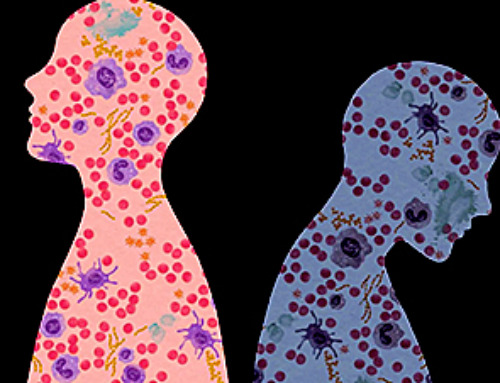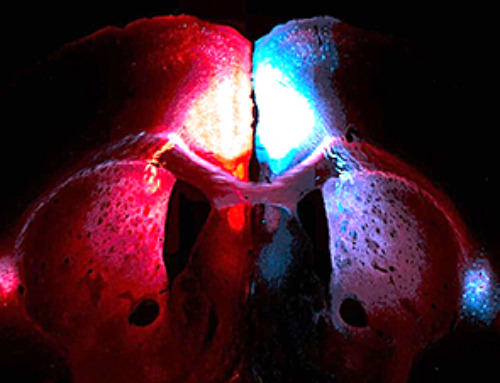One in four people has a mental disorder, according to the World Health Organization. If you’re lucky enough to live in a wealthy country, treatment will usually involve some form of medication—which can cause more issues than it fixes.
The reason for that lies in the depths and complexities of the human mind. It is made up of a maze of pathways that connect the different parts of the brain. They are in turn governed by chemicals that dictate our thoughts, emotions and actions. When a person has psychiatric disorders such as depression, anxiety or addiction, this intricate landscape is often clouded in shadow.
Medicating as a form of treatment touches every part of that complex system, the areas you want to treat and everywhere else besides. However, research is uncovering a light at the end of this metaphorical tunnel—a technique that uses ultrasound to change how the brain behaves.
When people hear the term ultrasound, they probably think of the scans used to monitor the early development of babies in the womb. In that context, it works by emitting gentle waves of sound, and when they bounce off different parts of the body, they create “echoes” that are turned into a moving image.
The notion of using the same methods to modulate brain activity might sound like something out of a sci-fi novel. But it is grounded in solid scientific principles.
Focused ultrasound involves the targeted delivery of sound waves to specific regions of the brain, where they can influence brain activity. And unlike other forms of brain stimulation, such as transcranial magnetic stimulation or deep-brain stimulation, the use of transcranial ultrasound stimulation (TUS) offers several distinct advantages.
For starters, it is non-invasive, meaning there’s no need for surgery or implantation of electrodes. The ultrasound machine is simply positioned onto the hair with gel and delivers ultrasound.
This not only reduces the risk associated with invasive procedures, but also makes it more accessible to a wider range of patients.
Also, focused ultrasound can precisely target deep brain structures with unprecedented accuracy, allowing for personalized interventions that address the root causes of brain disorders, whether neurological, like essential tremor or psychiatric, like addiction.
This level of precision holds the promise of personalized medicine, where treatments can be tailored to individual patients based on their unique brain organization and symptoms.
Vast and varied
The potential applications of focused ultrasound in treating brain disorders are vast and varied. Notably, one of the most remarkable findings is its ability to reduce tremors in individuals with essential tremor by targeting the deep brain regions responsible for excessive movement.
In depression, researchers have also explored its ability to change the activity in the dorsolateral prefrontal cortex—a region of the brain that has been implicated in mood regulation. By gently nudging this area with ultrasound waves, scientists hope to alleviate symptoms of depression and restore balance to the brain’s emotional circuitry.
Similarly, TUS shows promise in anxiety disorders, where aberrant activity in the amygdala—an almond-shaped structure involved in fear and stress responses—can contribute to pathological anxiety. By precisely targeting the amygdala, researchers aim to dial down its hyperactivity, offering relief to those plagued by incessant worry and dread.
Even more complex conditions like addiction, characterized by disruptions in reward sensitivity, cognition and social functioning, may benefit from TUS interventions. Some UK research teams are currently working on a trial looking at its potential to address alcohol addiction. By modulating activity in brain regions associated with reward, the hope is to mitigate the debilitating effects of the disorder and improve patients’ quality of life.
The complexity of psychiatric disorders poses another significant hurdle, and imagining this as a one-size-fits-all solution is perhaps fanciful. But this is a field where treatment options are limited and outcomes vary widely. Against that, the prospect of precise brain interventions that target the root causes of psychiatric disorders could revolutionize psychiatric care and offer hope to millions around the globe.
As the mysteries of the brain are continuously refined and technology can allow us to reach its deeper parts, there is hope that we will find ourselves on the brink of a new era in mental health care, where the shadows of psychiatric disorders are illuminated by the healing power of sound.
This article is republished from The Conversation under a Creative Commons license. Read the original article.
News
This New Blood Test Can Detect Cancer Before Tumors Appear
A new CRISPR-powered light sensor can detect the faintest whispers of cancer in a single drop of blood. Scientists have created an advanced light-based sensor capable of identifying extremely small amounts of cancer biomarkers [...]
Blindness Breakthrough? This Snail Regrows Eyes in 30 Days
A snail that regrows its eyes may hold the genetic clues to restoring human sight. Human eyes are intricate organs that cannot regrow once damaged. Surprisingly, they share key structural features with the eyes [...]
This Is Why the Same Virus Hits People So Differently
Scientists have mapped how genetics and life experiences leave lasting epigenetic marks on immune cells. The discovery helps explain why people respond so differently to the same infections and could lead to more personalized [...]
Rejuvenating neurons restores learning and memory in mice
EPFL scientists report that briefly switching on three “reprogramming” genes in a small set of memory-trace neurons restored memory in aged mice and in mouse models of Alzheimer’s disease to level of healthy young [...]
New book from Nanoappsmedical Inc. – Global Health Care Equivalency
A new book by Frank Boehm, NanoappsMedical Inc. Founder. This groundbreaking volume explores the vision of a Global Health Care Equivalency (GHCE) system powered by artificial intelligence and quantum computing technologies, operating on secure [...]
New Molecule Blocks Deadliest Brain Cancer at Its Genetic Root
Researchers have identified a molecule that disrupts a critical gene in glioblastoma. Scientists at the UVA Comprehensive Cancer Center say they have found a small molecule that can shut down a gene tied to glioblastoma, a [...]
Scientists Finally Solve a 30-Year-Old Cancer Mystery Hidden in Rye Pollen
Nearly 30 years after rye pollen molecules were shown to slow tumor growth in animals, scientists have finally determined their exact three-dimensional structures. Nearly 30 years ago, researchers noticed something surprising in rye pollen: [...]
NanoMedical Brain/Cloud Interface – Explorations and Implications. A new book from Frank Boehm
New book from Frank Boehm, NanoappsMedical Inc Founder: This book explores the future hypothetical possibility that the cerebral cortex of the human brain might be seamlessly, safely, and securely connected with the Cloud via [...]
How lipid nanoparticles carrying vaccines release their cargo
A study from FAU has shown that lipid nanoparticles restructure their membrane significantly after being absorbed into a cell and ending up in an acidic environment. Vaccines and other medicines are often packed in [...]
New book from NanoappsMedical Inc – Molecular Manufacturing: The Future of Nanomedicine
This book explores the revolutionary potential of atomically precise manufacturing technologies to transform global healthcare, as well as practically every other sector across society. This forward-thinking volume examines how envisaged Factory@Home systems might enable the cost-effective [...]
A Virus Designed in the Lab Could Help Defeat Antibiotic Resistance
Scientists can now design bacteria-killing viruses from DNA, opening a faster path to fighting superbugs. Bacteriophages have been used as treatments for bacterial infections for more than a century. Interest in these viruses is rising [...]
Sleep Deprivation Triggers a Strange Brain Cleanup
When you don’t sleep enough, your brain may clean itself at the exact moment you need it to think. Most people recognize the sensation. After a night of inadequate sleep, staying focused becomes harder [...]
Lab-grown corticospinal neurons offer new models for ALS and spinal injuries
Researchers have developed a way to grow a highly specialized subset of brain nerve cells that are involved in motor neuron disease and damaged in spinal injuries. Their study, published today in eLife as the final [...]
Urgent warning over deadly ‘brain swelling’ virus amid fears it could spread globally
Airports across Asia have been put on high alert after India confirmed two cases of the deadly Nipah virus in the state of West Bengal over the past month. Thailand, Nepal and Vietnam are among the [...]
This Vaccine Stops Bird Flu Before It Reaches the Lungs
A new nasal spray vaccine could stop bird flu at the door — blocking infection, reducing spread, and helping head off the next pandemic. Since first appearing in the United States in 2014, H5N1 [...]
These two viruses may become the next public health threats, scientists say
Two emerging pathogens with animal origins—influenza D virus and canine coronavirus—have so far been quietly flying under the radar, but researchers warn conditions are ripe for the viruses to spread more widely among humans. [...]





















